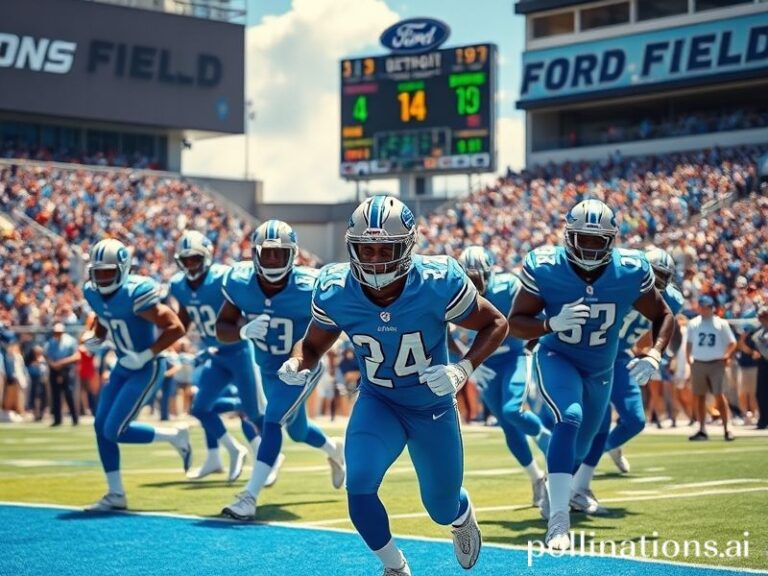How Danielle Fishel Became a Global Soft-Power Weapon—One Rerun at a Time
Danielle Fishel and the Miraculous Export of American Nostalgia
By Dave’s Foreign Correspondent-at-Large
In the grand bazaar of global pop culture, where K-dramas elbow Turkish telenovelas for shelf space and Nigerian Afrobeats drowns out yesterday’s Latin pop, one compact unit of 1990s Americana continues to punch improbably above its weight: Danielle Fishel, forever Topanga, the thinking man’s manic-pixie dream girl from ABC’s “Boy Meets World.” While Washington weaponizes microchips and Brussels weaponizes cheese tariffs, the United States has quietly perfected its most durable soft-power munition—reruns. And Fishel, now 42, is the smiling warhead.
From the neon karaoke parlors of Seoul to the smoke-shrouded cafés of Sarajevo, millennials who never set foot in a Philadelphia classroom still speak fluent Topanga. Her earnest lefty speeches—delivered in floral maxi dresses strong enough to survive both high-school cafeterias and syndication contracts—have become a trans-generational Rosetta Stone. Ask a 35-year-old systems analyst in Lagos why she minored in Women’s Studies and she’ll shrug: “Topanga said I could do anything.” The State Department could only dream of such penetration.
Fishel herself seems mildly horrified at her own omnipresence. Promoting her latest directorial effort—“a Gen-Z thriller set on a doomed influencer retreat,” naturally—she told a German talk show, “I thought I’d be a footnote, not a footnote in six languages.” The host laughed the polite Teutonic chuckle that translates roughly to: “Americans always underestimate the viral half-life of their banalities.”
In Jakarta, entrepreneurs sell “Topanga 2024” tote bags next to bootleg Greta Thunberg stickers—both symbols of a planet that wants its activism gift-wrapped in nostalgia. Meanwhile, Russian state TV recently spliced vintage “Boy Meets World” clips into a montage mocking Western decadence. The joke backfired: Telegram channels lit up with demands for the full original episodes. Soft power, unlike polonium, rarely stays where you plant it.
The economics are staggering. Licensing fees for the show in emerging markets now outstrip what Disney originally paid its entire writers’ room. Analysts at Singapore’s DBS Bank estimate that global merchandise—Topanga lunchboxes, Cory-and-Topanga wedding Funko Pops, even Topanga-branded compost bins in Scandinavia—will top $180 million this fiscal year. That’s more than Estonia’s defense budget, and arguably more effective. Who needs tanks when you have comforting archetypes of American adolescence, sanitized of drone strikes and student debt?
Of course, nothing ruins a perfectly good cultural icon like meeting the icon in person. Fishel’s pivot to directing has yielded mixed reviews. Her debut film, “The Impossible Year,” about a teenage girl who relives the same day until she dismantles the patriarchy, was lauded in Iceland and derided in India as “an Instagram filter masquerading as cinema.” Variety called it “as subtle as a gender-studies seminar conducted via megaphone,” which, given current academic budgets, may be the highest praise possible.
Still, the brand endures. In Nairobi’s Westlands district, a rooftop bar hosts weekly “Topanga Tuesdays,” where patrons in thrift-store florals debate neoliberalism over samosas. In rural Chile, a commune screens bootleg DVDs for kids whose parents remember the Pinochet years and appreciate any coming-of-age story that doesn’t end in disappearance. Somewhere in the algorithmic ether, a Ukrainian TikToker live-streams herself crying through the prom episode while air-raid sirens wail—proof that even in wartime, the empire of feels finds a way.
Perhaps that’s the sharpest irony: the very nation that weaponized fast food and fighter jets has found its most enduring export to be a curly-haired teenager who once lectured a classroom about Walt Whitman. Danielle Fishel didn’t set out to become a geopolitical comfort blanket, yet here we are, snuggling under her syndicated warmth while the planet smolders. If that isn’t the American dream—accidental, profitable, and slightly delusional—nothing is.
And so, as COP delegates bicker over carbon credits and central banks flirt with digital currencies, the real currency remains unchanged: a 4:3 aspect-ratio memory of simpler times, dubbed into 27 languages, streaming 24/7. Topanga endures, because we need her to. The world meets girl, and girl keeps meeting world. Fade out on canned laughter that sounds suspiciously like crying.







